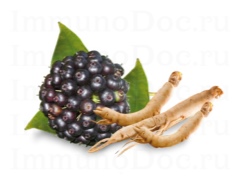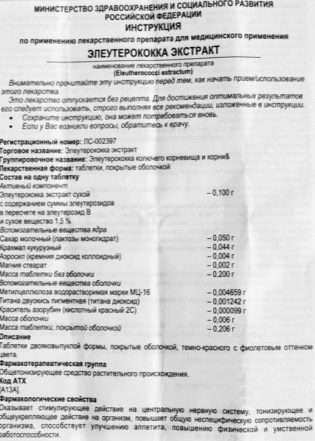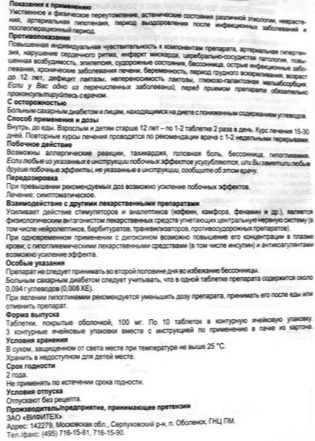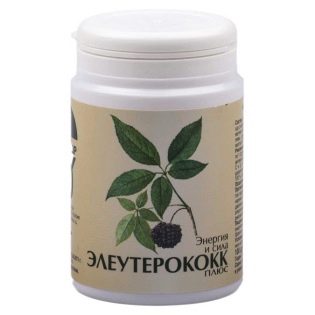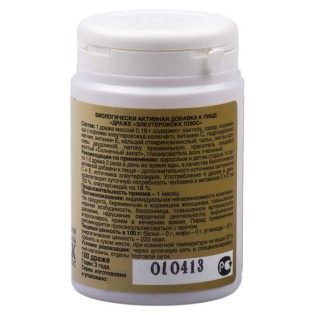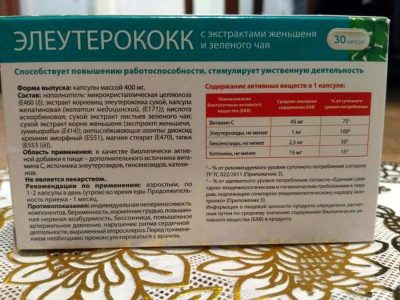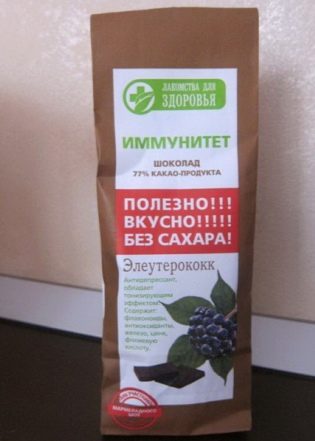Eleutherococcus for children: instructions for use
Many have heard that Eleutherococcus is a plant that is not inferior to the miraculous ginseng, whose reserves on the planet are rapidly being depleted. It invigorates, gives strength, helps to cope with increased loads, has a strong strengthening effect on the immune system. But few people know for sure whether it is possible to give preparations from this medicinal shrub to children and how to do it correctly. We will tell about this in our material.
What it is?
The complex name "Eleutherococcus" has synonyms. Often this shrub is called a hell bush or a hedgehog tree. These national names fully reflect the appearance. The shrub is high - up to 5 meters, prickly, in the fall on it appear round black fruit.
Eleutherococcus grows in Japan, in China, as well as in the Russian Far East - in the Primorsky Territory, on Sakhalin, in the Amur Region.
Medicine drew attention to the shrub only when scientists had to look for a natural alternative to ginseng, which occurs less and less.
The first properties of the bloody bush were discovered by scientists from the Far Eastern University of the Russian Academy of Sciences.
In pharmacology, the roots and rhizomes of the shrub are used. They are obtained in the fall, cut and dried at high temperatures. Subsequently, various preparations are made from this raw material.
Useful and healing properties
Due to the unique natural composition, which includes vitamins, glycosides, pectin substances, resins, essential oil, eleutherococcus is considered an excellent means to stimulate the activity of the central nervous system. It increases stamina, makes it easier for the body to perceive increased mental and physical stress.
Proved and positive effect of the drug to enhance immunity. Eleutherococcus improves blood circulation, lowers cholesterol and blood sugar, and speeds up metabolic processes.
Harm and contraindications
The main contraindication is the tendency to allergies. But allergic reactions to the drugs of Eleutherococcus are rarely developed.
Due to the pronounced effect on the central nervous system, preparations containing this raw material are prohibited from giving to hyper-excitable children, as well as children with sleep problems. Do not give the drug during the disease at elevated body temperature. Contraindications include heart disease and even heart rhythm disorders that are quite common in childhood.
If the child has a tendency to convulsions, you should also not give him Eleutherococcus medications. For sweet forms of release, contraindication is the presence of diabetes in a child.
Operating principle
Eleutherococcus belongs to the group of adaptogens. Earlier in pharmacology, this term was used, and drugs that enhance the adaptive abilities of the human body were allocated to this separate group. Today, a separate group does not exist, but the term "adaptogens" continues to be used by physicians.
Individual substances in the composition of the rhizomes and root of the shrub affect the nerve receptors, increasing the rate of signal transmission between axons. The brain stimulates the work of all parts of the nervous system.Immunity is strengthened by stimulating the production of non-specific antibodies that increase the body's resistance to common viral and bacterial diseases.
From what age is appointed?
In official instructions for preparations with rhizome of Eleutherococcus manufacturers indicate that the products are contraindicated in children under 12 years of age. This fact does not give rest to parents. Manufacturers are obliged to put such a restriction for one reason only: no clinical trials, the results of which would be officially documented, were performed on children.
Scientists and pediatricians tend to believe that the drug can be taken to children. The only age limit is the age of up to a year, although some pediatric doctors take responsibility and recommend drugs to children in the first year of life. For different drugs and forms of release has its own age limit. We will tell about them below.
Indications for use
Considering the effect that the chemical composition of medicinal raw materials has on the body, Eleutherococcus in childhood with no contraindications is recommended in the following situations:
- to improve performance (children during exams, at the beginning of a visit to kindergarten or school, for children experiencing severe mental and physical stress);
- for the prevention of SARS and influenza, as well as other seasonal mass diseases;
- for faster rehabilitation after operations and injuries;
- to improve memory;
- to improve hearing and vision;
- to increase appetite and normalize metabolism;
- with neurasthenia, depression.
In the absence of contraindications, prophylactic doses of drugs for Eleutherococcus contribute to a more harmonious development of the child.
Forms of release and application instructions
Dried rhizomes are used only in alternative medicine. The modern pharmaceutical industry produces preparations from the extract. There are several forms of release.
Tincture (liquid extract)
Ethanol is used to prepare the form of the liquid extract, and therefore the drug is not allowed to be given to children under 12 years old. And even for them, a means is required to be diluted with water in a ratio of 1: 3.
The course of admission should not exceed one month, after which you need a break. Instructions recommends dispensing tincture drops.
Children 12-14 years old single dose should not exceed 12-14 drops, children from 14 to 18 years - 14-20 drops. Adults can take from 30 drops.
Tablets (dry extract)
The most popular drug "Eleutherococcus-P". Tablets represent the pressed dry extract of rhizomes of a bush. The drug is designed for long-term use, because it has a cumulative effect.
The general course is a month, after which a break should be made for the same time.
Children over 12 years old can be given 2 tablets 2-3 times a day, children of earlier age should not exceed 1 tablet with a frequency of taking no more than 2 times a day. For babies under 5 years old, the drug is not recommended due to the peculiarities of taking the tablet form of release.
Syrup
The drug is an aqueous extract of the extract. Pediatricians often prescribe Eleutherococcal syrup to children older than 3 years. In addition to the base, it includes rosehip extract, vitamin C and a number of related substances, including sugar. Syrup is considered to be the preferred form for prophylactic administration during the period of mass morbidity, since glucose enhances the immune stimulating effect of the main substances.
The drug can be diluted with water, and can be given in its original form. Dosage is prescribed individually depending on age.
Dragee
“Eleutherococcus-Plus” in the form of dragees is not recommended for children under 3 years old, since it contains beeswax. Older children are allowed to take pills, but with the definition of individual dosage by the doctor.
Capsules
The capsule form of the drug is designed for use by children over 7 years old.Capsules are enriched with vitamin C and calcium. Dosage and multiplicity are not regulated, and therefore determined by the doctor.
Other forms
Do not stand aside and food industry workers. On sale you can find chocolate with Eleutherococcus, figured marmalade. Thus, parents can combine medicine and treat. By the way, eleutherococcus is a part of the well-known carbonated drink "Baikal".
Side effects and overdose
Side effects, as well as overdose symptoms, but in a more pronounced form, should include digestive disorders after ingestion, nausea and increased drowsiness, rapid heartbeat, and allergies. Your child may have high blood pressure or severe headaches. If these symptoms appear, you should stop taking the drug and consult a doctor.
It is undesirable to take drugs in the evening, because the stimulation of the central nervous system will interfere with the normal sleep of the child.
Interaction with other drugs
If a child is medically taking medications that stimulate the central nervous system (stimulants), the simultaneous use of Eleutherococcus can cause symptoms of overstimulation, increased nervous irritability, and neurological disorders.
But the actions of anticonvulsant drugs, barbiturates may be insufficient if the child is given the drugs with extract of Eleutherococcus at the same time, since their active substances are antagonists.
Reviews
Reviews on the practice of drug use in childhood are different. The most important question is whether the effect persists for a long time. There is no definite answer to it. Despite the fact that some sources claim that the preventive effect lasts up to two months, real reviews and recent scientific studies do not confirm this.
A lot of good reviews about the use of drugs by children who are professionally involved in sports.
Many parents are afraid to give children Eleutherococcus, given the possible side effects. The effects of substances are not well understood, and therefore it is often possible to find articles, "horror stories."
When deciding whether to give a child a certain drug, it’s better not to be guided by the feedback, but by the opinion of your pediatrician.
Analogs
Analogues of Eleutherococcus does not exist. Similarly, but with minor adjustments, tincture and ginseng root act, but drugs with ginseng are much more expensive.
The only analogues of pharmaceutical drugs can be considered tinctures and decoctions made from dried rhizomes of the shrub alone. But for children's use, this method of use is not recommended, since it is quite difficult to maintain the desired concentration in home cooking.
See the following video for the wonderful properties of Eleutherococcus.
